|
VISIT OUR MASSES and HOMILIES ONLINE! CLICK BELOW TO WATCH
St. Elizabeth of Ravenna Catholic Church
*** ANNOUNCING: NEW BOOK RELEASE FEBRUARY 2022 ***
Ethnic Atlas of the United States: National Maps 1980 - 2020

This ethnic atlas from Earthhealing, Inc. and published by Brassica Books, has been a work in process for over 40 years, perhaps longer than most research projects -- and involving the same three people over that multi-decade period. This book contains five specifically colored national maps from 1980 - 2020, showing ethnic pluralities of every U.S. County (3,126) using racial and ancestral data drawn from the last five federal decennial Censuses. Textual highlights are included about each state and major ethnic groups represented.
Obtaining a static overall view at one time has some merit, but a more challenging puzzle is to describe the changing face of ethnic America over time, a truly social, ecological, cultural and environmental issue worth pursuing. We strive to record how variation in 80 racial and ethnic groups have changed in all U.S. geographic areas over this recent half century period. When comparing the entire map series, one discovers the distinct flavor of America's major ethnic groups; remember that behind the scenes a wide variety of minor groups exist and even thrive. An environment in which diversity is both recorded and celebrated is an enriching one and is worth celebrating.
Observing ethnic shifting is itself dramatic and can be partly realized by comparing the five general ethnic/racial maps that have been standardized to contain the same color codes and groupings. Increasing mobility of the American public complicates the ethnic picture; it tends to erode certain concentrations of ethnic groups and causes a greater intermixing of new communities.
We are all ethnics to some degree; it is just that other issues in life often erase this focus. In the deep-down heart of things, most people would like to uncover more about their own roots and share them with others. Many agree that cultural differences, when celebrated and respected, add to the rich totality of the American experience. For this reason, we encourage the people who take pride in their ethnic backgrounds to celebrate and enjoy their togetherness when gathered at given opportunities. In many cases, this sharing extends to outsiders who venture into such gatherings and are welcome. Thus, we hope that this continued cultural consciousness will help in the global collaboration needed to save our wounded earth.
Digital eBook available at Amazon.com
Earthhealing Team – Al Fritsch, Janet Kalisz, Mark Spencer
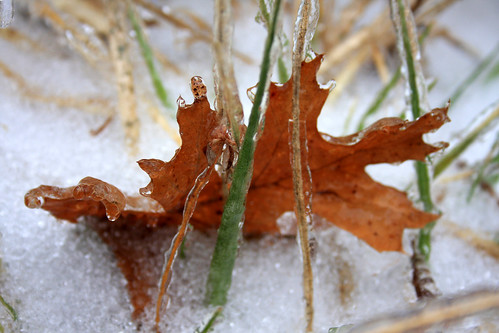
Frozen remnant of autumn.
(*photo credit)
February 1, 2022 Broadening Perspective through Reading History
We all need to know history -- and there is a host of books out there. Much depends on a willingness to become selective and spend time reading from a variety of topics and times. Such knowledge gives us a better understanding of conditions at various times and can lessen biases we may harbor about certain peoples and cultures. In fact, through good history we enter into the story and make it come alive; we start to ask how we might have made better decisions leading to some event, partaking in happenings long past their actual occurrence.
Study history -- We challenge all to learn from our past history, for its moments of glory help us endure troubled times. Quite often the closed-mindedness of warring parties ought to be demonstrated, so we become aware of where we stand on issues. Throughout history, movements must be seen in their context and how they resulted in benefits or harm to various parties. Persecutions occurred from outside or within; struggles, festivities, cultural occasions, and important leaders came and went.
Refute misconceptions -- Quite often people, with hardly a remembrance of what happened a few years ago, will be mesmerized by sketchy information and an accumulation of distortions; they may even consider themselves as knowledgeable of history. Those proponents or enemies of a particular group allow themselves to be caught up in the remarks of ill-educated folks with only scraps of past facts. Duped by the duped becomes a contagion that affects our world, with its limited attention span to detail. Knowledge of sound history permits us to know the situation better.
Towards a new understanding -- We are encouraged to speak up for what we hold firmly, and to find an opening when we can defend truths we hold dear. We ought to be driven to go beyond glib conversational remarks that have little or no depth, to a deeper discussion of what is so needed to acquire a good moral and ethical stand. Often, those who have joined looney groups have unaddressed issues that could be met if an opportunity affords itself and we avail ourselves at such occasions. The seriousness of response by an ongoing student of history is an opening to converse.
Ramifications of a study of history extend far towards healing a troubled Earth. As mentioned elsewhere, Earthhealers need to be thorough, balanced, spiritually directed, and quite serious about environmental issues at hand. A general or particular study of history makes us aware of practices that we take for granted and others that we have dropped over time. Maybe the phrase "It is Global Warming stupid" requires an historical context, demanding a study of history on our part. We hope your study is enjoyable and profitable for all.
Grace for Endurance: Creator Lord, in all honesty I find this month of mid-winter quite difficult. You challenge us to be nice and kind to others and to all creation, and so we have the shortest month -- but really longest in psychic time. Allow me to see the first sign of green (wild garlic) and hear the mourning dove, the harbinger of spring; we can almost hear the tree sap rise and observe the maple syrup gatherers making their rounds. May this slow season be quickened, for all that is slower than molasses in January is molasses in February. Lord, you give us so many simple things to fill the season, but help me give a little more time to praise you for all your creative handiwork.
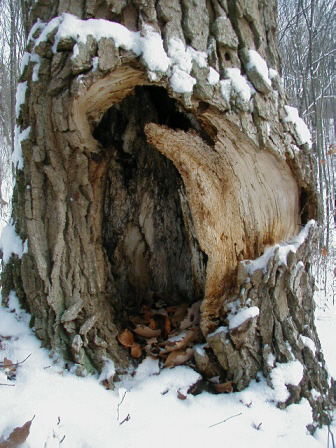
February 2, 2022 Viewing Winter Delights
On Groundhog Day, we think about little varmints, which are as anxious for spring as we are. We crave new life and so watch for the sprouts of first flowers and we scour the landscape for the wildlife peeping about. Let's not neglect to inspect dens, trees, thickets, and barnyards, for companion animals tell us how they endure wintry blasts and stay balanced and alert. We fixate on modern electronic devices and TV images of distant places, and isolate ourselves when we ought to look outside of our den and see if we see our shadow. We endure and curse the darkness when we ought to proclaim the strengthening light of longer days.
Other creatures endure the winter without complaining, and they live in resigned contentment. We have to count our blessings; we have survived and right now are free of a host of communicable diseases that spread in wintertime. If we are blessed with physical eyesight, we are able to look about: evergreens sway in the breeze, shaggy-coated livestock are huddled, kids scamper about when weather permits, naked trees have their beauty, and days are truly getting longer. We have much to be thankful for being alive in February and resolving to become ever more active as the days become warmer. From our book Appalachian Sensations: A Journey through the Season we offer this excerpt:
February -- Farm Animals in a Barnyard
Mountains and hills,
orchards and forests,
wild animals and farm animals,
snakes and birds....
Let them all praise the name of YHWH.
(Psalm 148:9-10, 13a)
All God's creatures give praise. That includes animals wild and tame. Farm animals are not just for human gain in meat, milk, eggs, and wool. These animals are here to accompany us on our way, and are praiseworthy in what they are and are able to offer us. The sight of herds of sheep or goats or cows draws us to contentment and peace. Do we users of animal products remember the sacrifice our livestock make to furnish us a better quality of life? Some purists regard these animal sacrifices as too demanding, and refrain from eating meat or milk products or even wearing leather. We all need to heed a basic Christian message: treat all life with respect. Like Christ, we are willing to serve plants and animals as well as fellow human beings; we are to maintain and enhance all of life? We are all strangers and guests on this planet and we need to make it a home together.
---------------------------------
Prayer for Elderly Fulfillment: Lord, we glory in the words of Simeon who, in his old age, welcomed the long-awaited Messiah. In the same spirit of fulfillment may we find joy in what comes to us in time; thank you for giving us new manifestations of your glory. Too often we fail to see what has occurred in these times for us and thus lack the satisfaction of a more pleasant old age. May we, like Simeon and Anna, raise our arms in perfect gratitude for what we receive at this time.
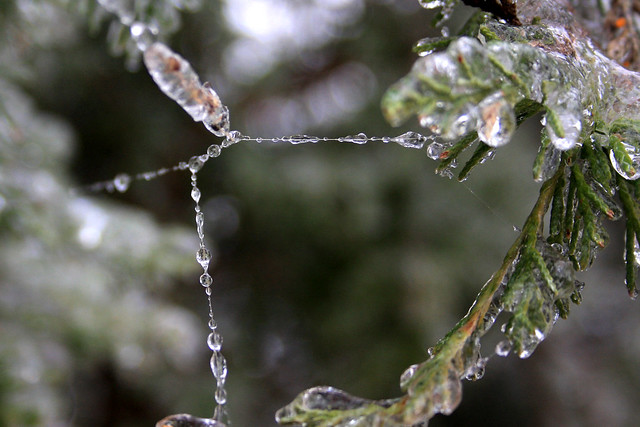
Delicate jewels made of ice. Kentucky ice storm, 2009.
(*photo credit)
February 3, 2022 Offering Prayers and Asking Prayers
In the critical age in which we live, believers affirm the power of prayer, both those offered by others for our undertakings and those we offer at the request of people in trouble.
The Power of Offering: I have gotten into the habit of telling people with problems or in need of support that I will offer a day of sacrifices for them or their loved ones. We are part of the community of the suffering on Earth and my sympathy, listening ear, and often limited advice is not sufficient. It is fitting that offering help to another must include praying for them. At times some people do not hear or value the offer or forget it quickly. However, the majority -- even unbelievers -- are grateful. Perhaps, just perhaps, others will adapt the same practice. An added benefit is that when we offer a day for a person, we strive to do better that day and thus improve our spiritual growth.
The Power of Requesting: The rest of the reflection is not really a counter-gesture, but rather a participation in the community of prayer in this world. When someone asks me for food or alms, I request a prayer in response, for I am as much a beggar of God's good gifts as they are. A joint request is a better way of doing things, for to give in charity can become a weapon of power or an appeaser of consumption or excessive possession more than being a pure act of love. Furthermore, those who suffer from hunger have a powerful intercessory power, if they but see it in the global scheme of things. Thus, they may be people in need, but part of the need is the unique power of suffering for and giving help to others. God hears the cry of the poor.
The Power of Communal Awareness: We request because we are in need of prayer. We give because we should, and we ask because we need help also. The cooperative efforts of our world community means that what is held in common is worthy of sharing. The poor who are closer to God have a precious closeness to the aurora of Divine Mercy than many of us who regard ourselves as without need. Seeing the poverty of others helps us to see our own spiritual poverty. Over time, I have found that some people have never been asked for prayers, and certainly not from one who is giving them things. We share mutual needs, and, when we beg for their help, we show them the value that they have as individuals to help improve our lives. We are all in this together.
The All-Powerful Accountant: At times I forget all the people I have said I will pray for. I write down the special intentions for Masses, but sometimes forget the name or can't read my writing. In such cases, on days without intentions I offer for those who I have forgotten. In such cases of those of us becoming ever more forgetful, we ask God to do the accounting.
Prayer to Saint Blaise: Let us say with the whole Church and those watchful of their health: Through your intercession, St. Blaise, bishop and martyr, may we be protected from every disease of the throat and every other ailment. In the name of the Father and of the Son and of the Holy Spirit. Amen.
Why an Ethnic Atlas?
This monthly Facebook series deals with a type of environmentalism not generally recognized by the public: ethnic environment. We at Earthhealing have for decades been interested in an issue that is environmental in its own way: relations among neighboring racial and ethnic groups. We are interested first in Appalachian ancestral composition with the interaction of various cultural groups and their differences, and then in a more general way with the entire American scene. Our team has worked on an Ethnic Atlas of the United States: State Maps 1980 - 2010 as an environmental issue since the early 1980s using decennial census data to determine predominance in each of the over three thousand counties in the country. One can view the results of the earlier work up to 2013 by going to BrassicaBooks.com. Predominant ethnicity of each county for each of the four censuses (1980, 1990, 2000 and 2010) is clearly demonstrated along with a general discussion of ethnic groupings in each of the fifty states.
The current Ethnic Atlas of the United States: National Maps 1980 – 2020 digital edition is now available at modest price from Amazon Books. We have not decided whether to publish a paper edition, since it would demand so much extra work in handling and distribution. Granted, the differences in ethnic predominance over a five decade period can be compared by looking at the now available national ethnic maps (the first such undertaking that has been attempted to our knowledge).
Some will be disappointed that their favorite ethnic group such as Irish-American (no predominant county) or Italians (only a dozen such counties) are not equal to Germans, Afro-Americans and Hispanics. In fact, smaller numbers of Irish appear in virtually every county in the country but, except in some Mid-Atlantic and New England cases, they are missing. Almost one-third of the counties, especially in the rural Midwest and Northwest have German as the predominant group consistently over the past five decades. In 1980, before “American” was a recognized ethnic category, English stood out quite strong, but in such regions as Appalachia and the Ozarks these were substituted by the new “American” category. This is partly because many, especially white citizens of mixed backgrounds, claim a variety of generally Euro-American ancestry roots.
We are convinced that discovering the wealth of ethnic diversity will make American citizens within a federated nation more aware of differences; they may broaden their environmental consciousness in embracing the enriching value of plurality. The challenge for all citizens is to accept cultural differences while still affirming a unity in national purpose. Some do not have an ethnic consciousness but still realize that one exists in the many celebrations and festivals that are organized each year by various ethnic and racial groups. Being willing to learn about and even participate in diverse celebrations makes us more environmentally conscious, so that we will become more aware that plant and animal diversity is threatened by exploitative interests. Pride in ancestry and in ecological consciousness go hand-in-hand.
Digital eBook available at Amazon.com
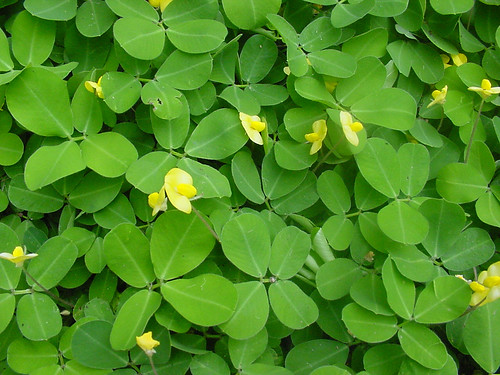
The peanut plant.
(*Photo by Rae Allen, Creative Commons.)
February 4, 2022 Celebrating Peanuts-in-Foods Day
Peanuts as a favorite food is of more recent popularity in America. This is especially true in use as a crushed spread, but also as roasted nut and in a whole variety of other ways. We are amazed that George Washington Carver developed 300 uses for peanuts a century ago. Recall that the goal was to demonstrate immense utility with this plentiful and nutritious economy food.
This "peanuts-in-foods year" is combined with the positive ecological characteristics of the leguminous peanut plant (Arachis hypogaea): soil improvement; fruit-bearing underground and not on trees susceptible to storm damage; and ease in harvest with high yields per acre. Here is an intensive crop that is also proteinous and takes less land in contrast to many types of meat production. The peanut contains antioxidants and is regarded as a wonderfully balanced food.
Roasted peanuts are a favorite American snack. Peanuts can be eaten by themselves or in combination with popcorn, mixed nuts, and sugary ingredients to act as snack foods and trail mixes. Peanuts are found in cakes, ice cream, a wide assortment of candies, custards, and other desserts. We also know that peanuts are tasty additions to fresh salads when sprinkled over them as a topping. Peanuts have been added along with fruit and mixed nuts for both cold and hot cereals, a welcome addition to breakfasts.
Peanut butter, that happy American invention, is a favorite of youngsters with jelly of various types and tastes. However, the ways are numerous to add a dash of peanut butter to fresh vegetables and fruits with various degrees of success. We include some of these among ordinary salads, but the way is open to include less familiar veggies dashed with peanut butter such as leeks, kohlrabi, and Japanese radishes.
Peanuts and peanut oil can be found in numerous dishes from other lands. Soups and cooked dishes with peanuts had hardly been tried beyond inserting with oatmeal in scrambled eggs. Africans have many peanut dishes that are fried or boiled, but these await testing for convenience and satisfaction. I have only recently used peanut oil and find it works well in salads. Peanut oil and other ingredients have been added to ice cream, peanut milk, and various other commercial materials --provided ingredients are listed and all customers are alerted.
Note: About one to two percent of people are severely allergic to peanuts and can go into shock and constricted breathing if unknowingly subjected to peanut products. We sympathize with them, respect their plight, and caution all who suffer from such maladies (and their caregivers) to examine food labels. Many but not all peanut allergies can be treated.
Prayer in Hard Times: Great Guardian and Protector, you have a special liking for the impoverished multitude. You are the God of the Anawim, the little overlooked ones. During the Great Depression days and current pandemic, you were and are at our side, giving us special blessings and the promise that things will be better. You cast a kindly eye on the ones washing dishes, on tanned workers of the fields and husky folks in their plain-clothed best, who humbly worship in your holy places. Comfort all folks through your providential care, especially those who lack funds for food and lodging.

Installing solar panels on St. Elizabeth of Ravenna Church. Ravenna, KY.
February 5, 2022 Emphasizing Twelve Reasons for Solar Energy
The environmental consideration for this month is solar energy applications. Days are getting longer, and we experience the warming rays of daylight as we pass winter's mid-point.
1. Ecological reason. Solar utilization emits no carbon dioxide or methane. Currently, the global greenhouse gas index continues to rise, and is rapidly reaching the point when renewables must allay major damage from greenhouse effects.
2. Investment friendly. The solar source comes free of charge. To capture, store, and utilize solar energy takes some investment, but the payback is reduced by eliminated electric bills; excess solar energy can be returned to the common electricity pool through intertied systems.
3. Solar potential is highly dispersed. The American South and Southwest have higher potential for application, but all parts of the country are suited for many solar applications.
4. Environmentally benign. No renewable energy is perfect, but solar is far more friendly than non-renewable sources and production. Solar fits the bill as one of the best ways to reduce global warming and help save the planet, and in coming years the application prices will decline still further.
5. Safety. All energy sources can be misused, but some are far more problematic than others. Treating solar photovoltaics with respect will mean no accidents will occur. Replacing nuclear power plants with solar and wind energy could reduce risks of nuclear damage from an earthquake, tsunami or terrorist attack.
6. Economics. Solar energy panels are dropping dramatically in prices in the past few years and are destined to become cost competitive in a matter of a few years. Certain solar coatings for roofs will mean a vast increase in use is expected. Taxpayers bear non-renewable hidden environmental costs and high subsidies that if applied to solar energy would hasten its competitive position.
7. Ease of startup. Solar, like windpower, takes less time from construction to start-up (one or two years instead of nearly a decade for a nuclear plant).
8. Proven tradition. Solar energy has been used in certain applications such as clothes drying, water heating, and warming of interiors for centuries by many cultures.
9. Job possibilities. An immense potential for jobs creation exists (some 300,000 new jobs have been created in the last three years and more are on the way).
10. Energy independence. Solar is not the total answer, but it is part of a balanced solution for it can effectively contribute to a renewable energy mix that is coming in the future. Solar energy helps ensure security from risky foreign oil sources.
11. Consumer satisfaction. People are drawn to solar energy just as moths are drawn to light. This natural affinity for sunlight translates into welcoming solar energy into the home.
12. Homesteading process. Solar can be used in domestic and small business applications independently from a broader system.
Saint Agatha: We think of you, and all the other young virgin martyrs of the early Church. You were so willing to give your life for Christ before the normal span of years -- true sacrifice of love and devotion. For your sacrifice, the whole Church and members from early times honor you through recognition -- that has continued down through the ages. We have persecutions in this century and hundreds have died in total sacrifice. May we all have a sense that this is the seed of the Church and worthy of our deepest appreciation. Lord, may the martyrs praise you!

A moment of reflection along a quiet woods trail.
(*photo credit)
February 6, 2022 Finding and Incorporating New Earthhealers
I answered, "Here I am, send me." (Isaiah 6:8)
The Gospel passage (Luke 5:1-11) tells of the disciples pulling out into the deep with their fishing boats and at Jesus' direction casting their nets into the sea. After a night of fruitless fishing, they were overwhelmed with an abundant catch at his direction. Then Jesus invites them to turn their harvesting skills to catch people rather than fish. These fishermen left their nets and followed Jesus.
The story of following a calling seems simple at first and yet we are all too familiar with backsliding and excuses that do occur. Invitations to a noble calling seem so easy, but times can get rough, so we must be realistic in being called and in extending the call to others. Our sense of realism must accompany the calling, for often Jesus tells his disciples about persecutions.
The caller needs the faith to endure difficulties. Many hold back from the calling to be healers of the Earth because there is little remuneration, and specific action is counter to the prevailing culture all around us. We are not Jesus, nor have the power of his character. From our part we must show sincerity in the act of calling for assistance, with the understanding that the call can be misinterpreted or the urgency not fully communicated. We notice that the receivers of the call may seek to find an excuse for not responding, or consider the matter beyond what they can do. We cannot compromise on truth; the caller must be prophetic and accept risks and do so with joy.
The recipient may recognize the nobility of the calling and, like Peter, asks Jesus to depart because he (Peter) is a sinful man. Peter here realizes his unworthiness and his need for improvement. Scriptures reveals Peter's denial of Jesus at the moment of greatest importance on Good Friday. However, God still calls him after the Resurrection; Peter grows into his ministry as head of the apostles. Healers learn about the length of process to experience and responsibility involves both care of self through personal improvement and service to others. Self-improvement is humble recognition of limitations in being Earthhealers.
The healing process has that dual component, namely, simplification of lifestyle by the healer, and a call to service in facing a troubled Earth. The process includes all improving together. Healing is an all engrossing process and some who have attempted to be such leaders in the past may be distracted by tempting high salaries, wealthy friends, offered perks, and cushy residences. However, those who seek to be more influential healers know the value of simplicity. So-called "privileges of the leader" should be avoided in the process of becoming sincere healers.
Miracles: Lord Jesus, you gave Peter and companions a filled boat of fish after their futile nighttime efforts. Peter was so overwhelmed that he felt his undeserving status before you and called himself a sinful man. You continued down through the ages bestowing healing miracles and those involving the calming of storms -- truly miracles of love and generosity. As Einstein has said "There are two ways to live our life, one is as though nothing is a miracle. The other is as though everything is a miracle." Strengthen our resolve to live the second way and to proclaim your mighty deeds to all the world.

The mourning dove, Zenaida macroura.
(*Photo by Alexanda MacKenziem Creative Commons.)
February 7, 2022 Enchanting Soundscape of February
This is winter, and sounds carry farther and more distinctively without the dampening foliage of summer that will appear again in several months. This essay was first drafted immediately after the last autumn leaves fell. For the first time in months, I could hear distinctly the rock crusher in the distant mountain quarry. In leafless times we hear shrill whistles of the passing train, roar of traffic noise in the distance, or planes overhead. We listen to recorded music or see a movie during this otherwise dry month. Let's make the best of winter "soundscape."
Really, human-generated sounds take second place to the sounds of nature -- the trickling unfrozen creek (think back to January's water sounds), the rustle of the ground squirrel impatient for spring, or the hearty winter bird residents hunting for a meal. We turn to the last of these, for they are able to give us some music in a season of general silence, whether the caw of the distant crow in the winter morn, or the hoot owl on a cold winter night. We focused on one such winter bird in our texts in the book Appalachian Sensations: A Journey through the Seasons:
February -- The Mourning Dove: Spring's Harbinger
The season of glad songs has come,
the cooing of the turtledove is heard
in our land.
(The Song of Songs 2:12b)
A characteristic Appalachian sound, coming somewhat early in the year, calls to the depth of our collective souls. It is the sound of the mourning dove, our commonest species in America (Zenaida macroura). The cooing we hear distinctly in February is the harbinger of spring, for when it starts we know the earth is awakening, the sap is quietly rising, and the tree buds are swelling ever so minutely. We come to love the peaceful dove's sound. These birds call us from winter's slumber to start again to come alive, to cultivate the land, and to bring God's blessings to full bloom through the work of our hands. The humble dove gives the first soft sounds, but if we listen we hear their soft‑spoken message, for from February emerges a growing expectancy of spring.
We impatient folks despise cabin fever. Will winter ever end? Perhaps so, if we attune our senses to subtle sounds of change. In Lent's somber modes, let us listen to sounds like the mourning dove's cooing. Nature and its creatures are marvelous teachers, if we are patient enough to listen.
----------------------------
Mourning Dove Prayer: Lord God, you awaken us and we thank you each day for mid-winter sounds. Today, you allow me to hear the sorrowful sound of the mourning dove; we are confident that there will be renewal this year, for that harbinger of spring is sent by you to uplift my spirits. Lord, you regenerate our dropping spirit in blessed ways, through sights and sounds and smells that say so much. May we arise at the landscape songs and stretch out our arms to the heavens from where the tides of winter come and go. May we continue to reach for your embrace.
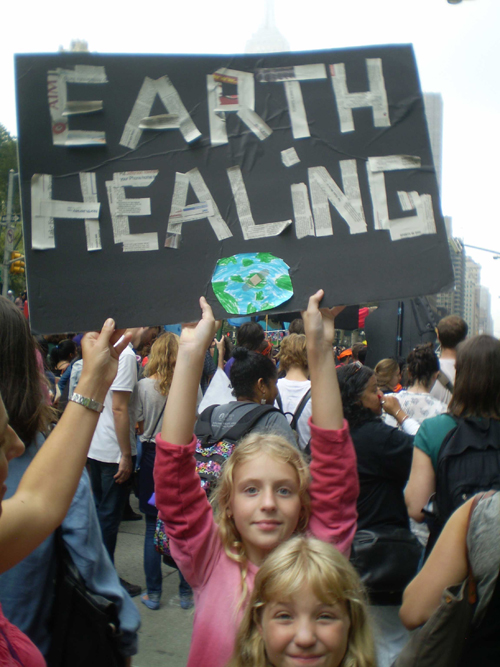
The Earth Healing team participates in People's Climate March, 2014.
February 8, 2022 Helping Youth Enjoy Nature's Benefits
Often it takes time and patience to teach youth how to enjoy the natural world around us. It doesn't necessarily come easily -- and much depends on parental attitudes. Some parents enjoy the outdoors in hiking, camping and spending time doing gardening and other outdoor activities; this is communicated to their young when even infants have been camping with parents and siblings. In other and all-too-frequent cases a parent may complain about bugs, snakes, humidity and showers and other minor inconveniences of being outdoors; these families miss opportunities to enjoy nature amid its roughness and the love for creatures that occurs though proximity. Youth have an opportunity to experience uncomfortable weather conditions and supply shortages. Insects can be worrisome, but can be endured as can wind, humidity, snakes, and sun.
Camping experience -- My first encounter with cool weather camping was within our parish scout troop. I vividly recall removing leaves below the tent and then enduring the chill of cold earth through the night. I learned from this experience that we keep leaves as insulation and comfort, after taking pains to remove any twigs and stones. This all seems to outdoor camping professionals as elementary, but it had not been emphasized prior to our first outing. We learn some things the hard way -- but in the many years since, when I have camped in all but three of our United States, the preparation of a tent site becomes a major ritual that harks back to that early youthful experience.
Acquaintance with nature -- Acquired skills have long-lasting effects and make youth into practical adults who can build campfires, learn not to fear the sounds of outdoor life during the night, and enjoy nature with expected discomforts. Amazingly, if not removed, discomforts or lack of skills stay with people and curtail enjoyment of the experience of woods and wildscape.
Practical skills -- Those most skilled in practical matters have the opportunity to enjoy nature more. Learning to make a campfire comes in handy many times in later life. Practicality learnt early allows a certain freedom at various critical times. Impractical folks defer to others and try to hide their lack of basic skills, somewhat like many illiterate people do. We recall that Jesus gets into a boat that pulled away from the crowds so he can address all meaningfully. Jesus is practical; he tells us to acquire the cleverness of shrewd stewards of resources while still not necessarily imitating their moral failings.
Joining forces -- A team of outdoors folks enjoy nature as much if not more than do most lone venturers. Earthhealing is one such joint venture, and past skills are a wonderful preparation to work towards a global collaboration. Let's find other like-minded individuals and develop occasions to enjoy nature together.
Physical Energy Prayer: O loving and merciful God, you give us energy to flex our limbs and muscles in order to stay healthy. Stir us to move about. In doing so, may we be invigorated in our spiritual journey of life. Yes, you want us to stay physically active, to relieve stress and tensions that accumulate, and to realize that exercise is prayer when done in your name. Make us aware that many harm themselves through neglecting proper exercise. May we follow your promptings and also nudge others to leave their couches, control their weight, get fresh air and full spectrum sunlight, and brighten their dispositions. May we move about with greater determination.
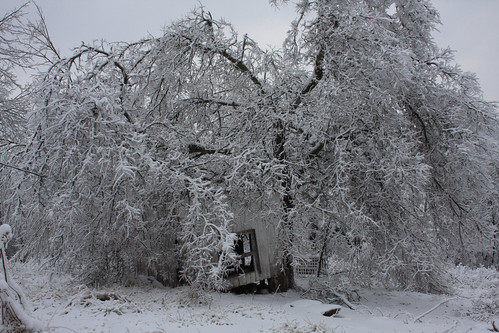
Branches heavy with February snow. Laurel Co., KY.
(*photo credit)
February 9, 2022 Witnessing During Critical Times
Everything that the Church is and does only acquires its full
meaning when it becomes a witness. Pope Benedict XVI
The question posed for this reflection does not mean that the content of the Good News has changed, for it certainly has not. The method of bearing witness to content changes to some degree. What is really new is the urgency of place (HERE a troubled world) and time (NOW as an opportunity to save our planet); furthermore, the need is to enlist all people for the global task at hand, for the world community is more than what we can do as lone rangers. WE must work together. To throw up our hands and give up is to isolate ourselves from a world in need; to say the work ought to be postponed because we are not yet ready is to evade the issue; to think that we can do this alone is unrealistic.
Witnesses are called to modify the manner of presentation when using social media; urgency comes at a new time and place, though urgency in one sense drives every generation in need for repentance and renewal. We find in our following of Jesus that to be a witness to his mission is to imitate him in many ways -- in extending love to all and mercy, especially to those in greater need. The change is that the times and places are different today than two thousand years ago; a global vista is more apparent today. Crowds are different and the cooperating teamwork demands respecting cultural differences while refining collaboration.
Technologies are certainly changed in the past two millennia, and so the voice of one calling in the wilderness is now done from the vantage point of radio waves and the media of TV and Internet. The witnesses announce an old and tested message that is of God's incarnate word being spoken in our midst. We have means of expanding our efforts beyond our voice range to a wider global audience -- and this deepens our responsibility. We are more able to connect quickly to other parts of Earth. Climate change and equality need to be addressed using limited but powerful resources.
Joyful witnesses are needed once more in a world of misery. We attempt to keep our cool, retain our sense of humor, and to cultivate our good will. In place of foreboding doom must be one of joy and hopefulness; at a time of dire predictions and terrorist threats is substituted that of joyful promise and opportunity; in the temptation to retreat into the isolation of self, we discover and proclaim the possibility of selfless working together for a better world where justice will prevail. In somber February we need to discover and express a hidden joyful sense, for the culture of death is overcome by life, despair by hope, and isolation by promise of global sharing.
Prayer while Limited: O Great God, teach us to desire and accept the lesser place where powerlessness prevails, where resources are hard to obtain, where scaling is downward, where the poor and voiceless will be better served, and where you call us with ever greater urgency to think and act in a truly lowly way. Help us to live simply, so others may simply live; may we accept our limitations as truly a challenge.
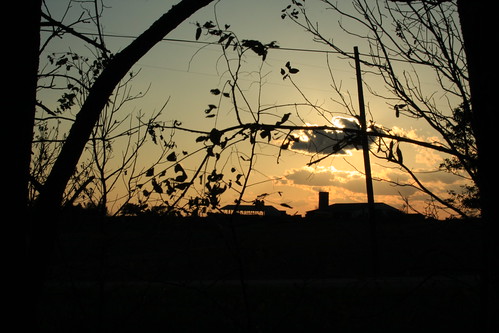
Rural Kentucky farm scene, at sunset.
(*photo credit)
February 10, 2022 Maintaining Mental Balance in Various Ways
February can be a dispiriting time for those of us who are indoors too long and crave the refreshing effects of outdoor springtime activity. February challenges our mental agility as well as willingness to do physical exercise. Let's hope some of the following seven general suggestions will help:
Keep occupied. Through the ages they tell us that "an idle mind is a Devil's workshop." Staying busy in mind may not be hard for a daydreamer, but it can be trying for average people enduring the latter half of winter. One suggestion is to prepare your day by listing things that must be done and others if time permits.
Champion creativity. Some like recipes, specific menus, favorite songs and music, old card games, commercial puzzles, and tried and true soap operas or TV shows. However, a more creative February calls us to make a new soup (perhaps using leftovers along with adding fresh ingredients), invent games, create your own song or music, try a new radio or TV station or media outlet, or invent your own puzzles worth solving.
Read a saint for the day. There are hundreds of them, in fact, so many to choose from that the sheer number is breathtaking. Google one on the Internet or buy a book with saints listed. Saints will raise our spirits when introduced into their company.
Take time and visit a shut-in. Think about the fact that others also find February a difficult time. They are out there and could use your good cheer. And sharing with others becomes an opportunity to lighten up one's spirits.
Play interactive games. This is a standard way to stay mentally occupied. I was never drawn to chess or bridge or other such intellectual occupations and must even concede that a younger Internet gaming crowd does have beneficial pursuits. Some even make a living in playing computer games -- and that certainly beats fuel-wasting "joy-rides" of a former generation.
Contact a friend. Is it wrong to tell another that you need uplifting? Now they can feel needed. Some people retain a sense of humor even in difficult times -- and so contact them. Distant communications are so much easier today -- phone, email, and postal means. Praying for another is a form of communication as well. Connecting with them can "make their day" and yours as well.
Rearrange records. Putting our house in order is always a way of discovering a lost record. Chances are quite high you will rediscover a long-lost item. That final look at a program or information sheet will serve its purpose even when you recycle it.
Winter Hiking Prayer: Holy Spirit, move my tired limbs to needed exercise, to leaving housing for the brief but needed sunlight, to breathe deeply the fresh and crisp air, and to open eyes to the grand outdoors even in winter. The movement recharges and quickens my spirits to await in hope what is to come, both this year and beyond. May I listen to the twittering of a stay-at-home bird to give me company; there an unlocked stream speaking of self-professing glory; elsewhere trees seem to yawn in awakening time, with enlarged buds ready to burst at the first occasion. May I pause Lord and thank you in humble praise.
Why focus on Diversity?
We choose to argue for a greater number of ethnic groups within a community, for in federated America there is strength in tolerating differences in some matters and unity in a general purpose of life, liberty and the pursuit of happiness. At the very start of our country the differences within the various colonies were recognized and tolerated while seeking a unified purpose of independence from foreign autocratic rule. Diversity was and is part of our cultural heritage, even though we have not perfectly practiced a purely non-racist and fully welcoming mentality.
In many areas of life we welcome diversity: socially, it is better to have many rather than few friends or associates; mentally, we are inclined to extend focus to more than one subject for the sake of balance; nutritionally, we need various foods of different tastes, vitamins and supplements; and biologically, generally experts tell us that the more microbial diversity the better is our health. Why not celebrate diverse ancestral cultures, especially in a federated democracy, which began with multiple groups within the scattered colonies? We champion the words of our American Great Seal, also found on many coins -- e pluribus unum (one out of many). In a sense of wellbeing and security our colonies united with a common goal, and for all intents and purposes this championing of diversity and simultaneous unity has succeeded to this day.
Over the centuries our country has seen certain original migrating groups become mixed and lose a sense of ethnic identity. But at the same time a multitude of immigrants and minorities with higher birth rates have become more numerous in various parts of our country. Diversity grows and diversity fades at varying rates. Hispanics and Asian Americans have increased rapidly in the 21st century and add to state-by-state diversity. Asian Americans are congregating in the California Bay area, Seattle, Metro DC and the New York Metro area, as well as other urban and research areas. Hispanics increase in the Southwest and now in virtually every state in both urban and rural areas.
At the same time, mixed Euro-American groups have witnessed intermarriage to such a degree that many with lack of singular identity prefer to be called “American,” rather than one of the ethnic groups formerly self-identified in censuses. However, the growth of the “American” category does not equal that of the rapidly expanding racial minorities -- Asian American, Hispanics, Native American and Afro-American.
Affirming diversity is more American than promoting ethnic mono-cultural amalgamation. Our hope is that this book will encourage a growth in ethnic consciousness, not only by those who acknowledge one, but by all citizens. We are better off when the many cultural groups are healthy and when members take pride in their different cuisines, festivals, dances, songs, and sporting events. Ancestral differences are worth celebrating, for they lead to a healthier general environment, something highly needed in our struggle to curb climate change in the immediate future.

Sunflower's head, food for winter birds.
(*photo credit)
February 11, 2022 Tasting Sweet Things in February
In the weeks before Lent many attempt to stoke up on favorite sweets and then to fast from them during the solemn season -- or at least that was our procedure when youngsters. We abstained from candy during Lent and awaited Holy Saturday. Such was the life of youth and also adults who still retain a sound sweet tooth.
In simpler times the sweetness was supplied from natural sweeteners. White sugar now found in so many of our commercial processed foods and baked goods was scarce. Some of us have participated in gathering honey and in making sorghum, both favorites of Appalachian people, both choice sweeteners. Other folks, especially in the northern portion of the region, have participated in making maple syrup at this time of year. The maple and other tree sap is rising, and this is gathered and boiled down to make the golden syrup that so many prize on pancakes and other delights. Allow us once more to insert our contribution to Appalachian Sensations: A Journey through the Seasons for February.
February -- The Glory of Sweet Things
All creatures depend on you
to feed them throughout the year;
you provide the food they eat,
with generous hand you satisfy their hunger.
(Psalm 104:27-28)
Tree sap is rising, a sign of new life in the early year. And some of that immense quantity of sap is tapped, because it is filled with nutrients and can be cooked into a favorite sweetening agent. Maple sap is boiled down to a tasty amber syrup prized by many. This precious liquid does not come free, for it takes human labor to tap maple trees, which are still plentiful in our region, and then to haul collected sap to cookers, who stoke the fires just so much, skim the boiling liquid, and collect the boiled-down, end product. What results of all this expertise and loving effort is authentic maple syrup; it is more costly of course, but far superior to imitation products made from corn. Through human efforts, the goodness of the Divine Provider is fully realized, like our offering to God of precious things given and refashioned by our helping hands. It takes energy to help save a troubled world, but our work can have a sweetening effect.
-------------------
Lourdes Prayer: O ever Immaculate Virgin, Mother of mercy, health of the sick, refuge of sinners, comforter of the afflicted, you know my wants, my troubles, my sufferings; look with mercy on me. By appearing in the Grotto of Lourdes, you were pleased to make it a privileged sanctuary, whence you dispense your favors; and already many sufferers have obtained the cure of their infirmities, both spiritual and corporal. I come therefore with complete confidence to implore your maternal intercession. Obtain, O loving Mother, the grant of my requests. Through gratitude for your favors, I will endeavor to imitate your virtues, that I may one day share your glory. Amen.
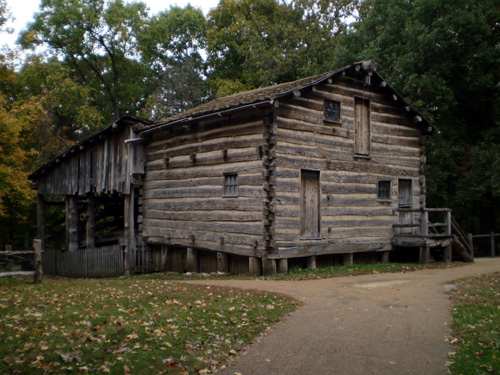
Scenes from Abraham Lincoln's New Salem
(*Photo by Mark Spencer)
February 12, 2022 Championing Lincoln: A Needed Hero
The mystic chords of memory will yet swell the chorus of the Union, when again touched, as surely they will be, by the better angels of our nature.
President Lincoln
One more time Lincoln's Birthday allows us to consider this authentic American president when still more books appear with what some thinks has never been explored about him. People, especially youth, need models to whom they can look up to for leadership and as exemplars in life. No one is perfect, and so we may be frank about lives and yet highlight the good points when possible. Lincoln is a most beloved president who best fits this mold. He became president at the most critical time in American history -- a nation was falling apart and eleven states seceded between his election and when he finally took office in March, 1861. To preserve this crumbling union demanded a courageous president.
Lincoln was courageous from the start. The contrast can be made with that of his predecessor, James Buchanan, who wilted at the prospect of the dissolving union and was unable to act decisively in that critical period. Lincoln listened to the sometimes unwise council of others who would have capitulated to Confederate demands. With a nerve of steel, the new president proceeded to conduct the affairs of state in such a manner that it caused the South to fire the first shot. His was a reaction to a provocation, even though others said to abandon Fort Sumter.
Lincoln was energetic but cool. Lincoln assembled a cabinet of natural leaders but strong egos; he risked having this group for it would precipitate hot discussion on critical issues. However, he desired to hear from them; as a leader he did not allow them to walk over him as some thought they could do to this Midwestern "rural bumpkin." He was always ahead of them even while listening to their arguments; he picked and chose from what they said. Lincoln never panicked even though times could have expected it.
Lincoln was hopeful. Not only would the union be preserved but that great dividing knife of slavery would be done away with through proper legal procedure. His hope was that a people could be one and equal and that it could be established in such a manner that the entire nation would prosper. In the longer run, Lincoln began to see that this land could not exist half-slave and half-free, and this emerging insight of his was a prescience to help overcome the global disparity of wealth that we have today.
Lincoln was merciful. Lincoln realized that healing a wounded nation requires forgiveness and integration of recent rebels back into the national fabric. Had he lived, Lincoln would have directed reconstruction with a greater sense of generosity than was the actual case. Amid acrimony and impeachment proceedings of Andrew Johnson, his successor, progress did occur but painfully so.
Prayer of Liberation: Lord, help us remember Abe Lincoln on his birthday; his resolve, his focus, his determination. Our people still need to be liberated from the tyranny of materialism in its deepest devilish form. Give us the insight to see the chains that bind us; may we earnestly ask for the strength to break them -- for the good of our brothers and sisters. Also, may we encourage our leaders to be forthright in their guidance.
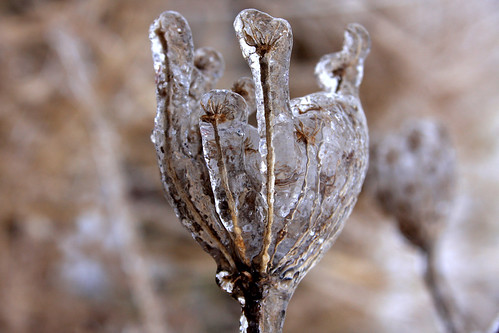
Kentucky Ice Storm.
(*photo credit)
February 13, 2022 Blessing the Poor
Blessed are you who are poor, for the kingdom of God is yours.
Blessed are you who are now hungry, for you will be satisfied.
(Luke 6:20-21)
In this Year of St. Luke's Gospel, note how often the poor are mentioned: the infancy narratives, temptation of Jesus, Good Samaritan, Lazarus and the rich man, hard saying to pharisees and others, and even Jesus' initial proclamation of his mission to his home town audience; the refrain continues throughout and even through Luke's companion volume the Acts of the Apostles.
Homily-givers, especially with the upcoming Valentine's Day, are tempted to say what is pleasing and soothing. "Why bite the hand that feeds you?" Is the homily meant to increase our popularity, or does spiritual leadership demand more? We can deny our privileges, excuse ourselves as doing some things with the poor, or simply escape to other issues. But face it: we are privileged with special gifts: national security, good roads, health care systems, educational facilities, a secure food system, adequate potable water, instant communications systems, and on and on. As privileged with many gifts, we must see gifts as serious responsibilities, opportunities to share, and as resources to respect and use properly. But this is not enough to say.
How can those who suffer so much be blessed? First, sufferers often have a sense of gratitude for the simple gifts given; the poor are often more receptive to seeing that they could have been overlooked and yet are somehow remembered. Some sufferers do not have such a grace of insight, and yet intuitively they know that comfort awaits them in a blessed future. Blessed is the one who trusts in the Lord, whose hope is the Lord (Jeremiah 17:5-8).
While the poor often include imperfect people who are conniving, subservient, deceitful and even greedy, still a sizeable number are trusting in God, for how else can they survive? They can understand a spiritual blessing, while others more or less fortunate rely on seeking comfort in real or imagined material goods. And the more materials possessed, the tighter the grip the average possessors hold onto their material things.
Do we seek to encourage the wealthy to give up what they regard as theirs, and allow this to become a double blessing? On the level of "should" one must say that when people become convinced that resources do not belong to them alone but to the Commons, the moral imperative to liberate the rich of possessions is present. Give it up freely and generously. Such a recognition of improper ownership by the wealthy is a spiritual grace so often overlooked by those seeking to hold tightly to the status quo of wealth and poverty. Liberation is a citizen imperative.
Grace for Honesty: Holy Spirit, you place within us the words that tell the truth at all costs. You bring to our mind remarkable people in our lives who are willing to sacrifice much in order to be honest in their dealings with others. Inspire us to recall their actions and to encourage others always to be honest, even amid a world of lies and misinformation. May the truth always be on our lips and valued for helping make us who we are.

Love of a devoted friend on Valentine's Day.
(*photo credit)
February 14, 2022 Being Neighborly and Martin Buber's I and Thou
When two people relate to each other authentically and humanly, God
is the electricity that surges between them. Martin Buber
On Valentine's Day, our thoughts turn to a special love we have for others. We recall again St. John's words telling us that God is love. Martin Buber puts that love of God in terms of electricity and there is truth in that, for it takes love to bring about all human bonding. In philosophy class over a half century ago, we read the rather influential book by Martin Buber, I and Thou, and it was highly regarded as a reaction to years of turmoil.
We do not use that term "thou" except in Shakespeare plays and traditional prayers of rather archaic texts. In fact, an effort to verbalize the familiar may actually be distantly formal in today's world of ever-changing language. However, we need closer relationships in a world of biases, stereotypes, and other ill-fitting categories. The I-thou relationship is one of love in a humane way, a growing together with others through authentic interaction first on a one-to-one basis and then gradually as through a ripple effect outward to the rest of the world. Agents in community-building should cherish this interpersonal love.
We do not deny our everyday treatment of others beyond the targets of valentines, that is, people we unfortunately treat in an "I-It" relationship. This involves the impersonal manner of transacting business. We hardly look up when someone waits on us at table, or even if we hold the door for a person with a cane. Eye never meets eye and the business of living goes on. We may argue the case for I-it relations in order to function with ease, but it can be really overdone in the quick-living circumstances of life. I wonder whether the "junk mail" I empty each day contains amid the vast array of garbage some needing soul just looking for a new I-thou relationship.
A third set of relations is the "eternal thou" with our God, a relationship we seek to enter with an all loving Creator who invites our entire love in return. This is a mystical union with our God, and really is the goal of our joining in intimate conversation with neighbor while aware of God's presence. We ought to start at our local neighborhood for that is what Jesus does. He exceeds his set bounds of the Holy Land on occasion, but still it is Israel that is the land of his ministry. He attends to the poor in spirit, the lame, and blind close at hand. Jesus is truly neighborly and we should take note. Let's give more humane attention to the local postal clerk, waitress, and policeman. Our world begins in a neighborhood, and our relationships can solidify through added attention to those near. Social relations must grow and building them takes special love. Happy Valentine's Day!
Grace to Express Love: Holy Spirit, on this Valentine's Day inspire me to express my love for others in some presentable manner. I know that words fail us; so perhaps through deeds, direct me to act in a way that I can show others a sense of kindness and that I care for them. I crave creative inspiration during this winter season.
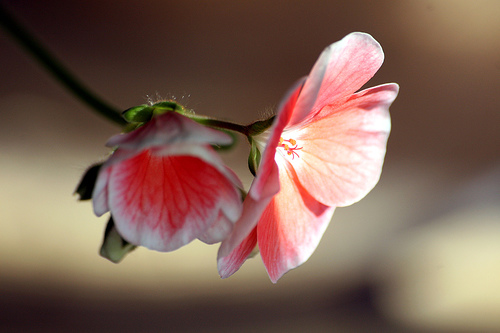
Subtle aromas of indoor-grown geraniums.
(*photo credit)
February 15, 2022 Highlighting Indoor Aromas in Mis-February
Our bias against February can be misguided, for human beings have a way of softening the seasons and even making them loveable. When people gather amid good aromas of cooked food or brewed hot drinks, they discover ways of coming together through animated conversation. The exchange helps knit communities into one and makes the hurts of neighbors be shared through compassion.
Once again, we include the text from our photo book, Appalachian Sensations: A Journey through the Seasons. Today's addition is not limited in any way to our region of the world, but is a social experience enjoyed by people who congregate to sustain life with and among others. The situations may vary but, in the case of caffeine-containing coffee, the smell is still good whether we tolerate caffeine or not.
February -- Sipping Coffee at the Gathering Place
...and through us is spreading a knowledge of himself, like
a sweet smell everywhere. (II Corinthians 2:14b)
We interact with others in community, and that seems to be part of our social nature. While I personally have not been known to tarry in the neighborhood gathering place, I do see value in social coffee gatherings. When traveling, I stop at mom‑and‑pop's or a fast-food restaurant, and observe local neighbors sitting around talking with each other about a little more than nothing. They are simply gathering, generating small talk, and making sure that everyone else is okay. Community wholeness is cemented by smell and taste. The regular group has a pecking order among talkers and the listeners; peer pressure is immense with noisy ones and quiet onlookers each in his or her place.
Coffee generates a social fabric in an otherwise fragmented world, where isolated folks gaze at TV. Thank God for fresh-brewed coffee wafting from the perking places. When I must join the coffee klatch, I hope I fit in my place. At times it is worth thinking about and anticipating the inevitable.
--------------------------
Grace to Exercise: Lord, we are so tempted to continue to rest and fail to rise and exercise ourselves when need be. It is most difficult to go outdoors when the weather is cloudy or inclement. Stir us, for physical exercise keeps us healthy. The garden space needs cultivating when snow has melted; the exterior needs cleaning up; the trees and vines need pruning; and we could use a push to get these matters attended to. May we overcome inaction and be of greater service to you.
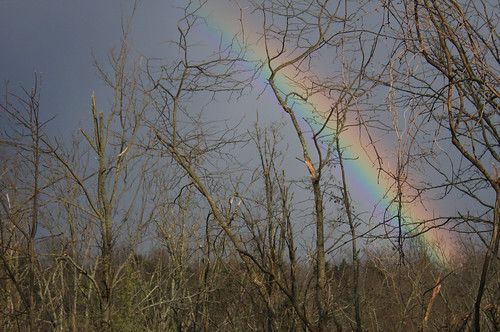
Pleasant surprise after shower during hike, Daniel Boone National Forest. Laurel Co., KY.
(*photo credit)
February 16, 2022 Remedying Depression through Outdoor Activity
People know and researchers confirm that those of us who get outside when possible are more able to combat depression. It is the combination of fresh air, full spectrum sunshine, and the scenic beauty of the great outdoors that can have a therapeutic effect on our mental and spiritual health; we need to touch the soil in some way. This could be through gardening, outdoor chores, physical exercise, or merely sitting or walking and taking in the beautiful landscape all around.
Fresh air and sunshine have an enlightening and softening effect on our nerves. The body responds with a sense of new life coursing through our bones in ways hard to describe. The lungs need oxygen; the body needs Vitamin D that sunlight activates; the soul needs unmarred beauty whether taken in individually through a gracious spirit or shared with kindred spirits.
Gardening has many advantages listed over the years at this website. A communion with Earth herself is part of the beauty that unfolds as we tend growing plants. Now is the time to sow the peas for the first of the spring crops. It is the time to prepare soil for onion bulbs, and tend the growing greenhouse brassica plants while looking for an opportune time to plant them when warmer weather occurs.
Outdoor chores include trimming the grapes, clearing up the vines and saplings from the fence row, pruning the fruit trees when the weather allows, cutting out briars, tending hot beds, obtaining some horse manure for banking herb beds, digging horseradish for Lenten meals, and checking watering systems for any winter storm damage. Outdoor work gives us a sense of progress that creates a more positive outlook. If we achieve little tasks we are better prepared for the big ones later in the growing year.
Physical exercise is often neglected during harsh winter weather when streets and sidewalks are iced over; even outdoor walking, hiking, or jogging is somewhat hazardous. However, when paths are clear, the way is open to take that trek in the great outdoors when we begin to detect the witch hazel and the sprouting wild garlic, and listen to the cooing of the mourning dove.
Sightseeing can also reduce cabin fever or wintry depression. This may occur by auto, bike, bus, boat, plane, or train ride -- or simply by foot. Some with financial resources might add that this is a perfect time for a world tour or to go to Florida. The change in scenes allows our mind to get out of well-worn ruts and start to survey the panorama of new scenes that flood our brains. In a last resort, if we cannot go outside due to immobility, go to the window and watch the birds or other wildlife, or neighborhood pets that come into view. They become a needed change of scenery.
Grace for Prayer Time: Lord Jesus, you taught the disciples to pray always. This means to stay connected with the divine at all times. We offer this up as an intention quite often, but then drift back into a host of unconscious random thoughts. May we give good and meaningful time each day to you, whether in morning or night, whether of long length or short. May we remember when waiting for an appointment to say a rosary; may we in the repetition of daily activities, when focus on actions is not required, give some additional time to prayer; may we say often throughout the day a short prayer of praise and gratitude. May our days be truly prayerful.

(*photo by Robert Dueweke, OSA, www.dueweke.net)
February 17, 2022 Finding Saints for Every Age
Holiness bloomed in every age if we look for them:
0-100 Virgin Mary, Elizabeth, John the Baptist, Paul, Apostles, Mary Magdalene, Martyrs of Rome, Luke
100s Ignatius of Antioch, Polycarp, Nereus & Achilleus, Irenaeus, Justin, Perpetua & Felicity
200s Calistus I, Cyprian, Agatha, Lawrence, Cecilia, Cosmas & Damian, Sebastian
300s Lucy, Agnes, Blaise, Helen, Anthony, Athanasius, Basil the Great, Monica, Ambrose
400s John Chrysostom, Jerome, Augustine, Patrick, Hilary, Genevieve of Paris, Leo the Great, Cyril of Alexandria
500s Colman of Dromore, Bridget of Kildare, John I, Felix I, Benedict, Scholastica, Ita of Killeedy, Gildas
600s Gregory the Great, Columban, Augustine of Canterbury, Isidore of Seville, Martin I, Mildred, Cuthbert
700s Odilia, Venerable Bede, Boniface, John Damascene, Walburga, Willibald, Giles, Stephen of Mar Saba
800s Methodius of Constantinople, Meinrad, Ansgar, Cyril & Methodius, Rembert, Edmund, Paschal I
900s Ludmilla, Olga, Wenceslaus, Odo of Cluny, Matilda, Romuald, Utrich of Augsburg, Maiolus
1000s Henry, Romuald, Cunegund, Stephen of Hungary, Odilo, Edward the Confessor, Margaret of Scotland, Gertrude, Gregory VII, Stanislaus
1100s Bruno, Anselm of Canterbury, Isodore & Maria, Norbert, Bernard of Clairvaux, Thomas Becket, Hildegard of Bingen
1200s Dominic, Francis of Assisi, Anthony of Padua, Seven Servite Founders, Hedwig, Clare, Albert the Great, Elizabeth of Hungary, Louis IX, Bonaventure, Thomas Aquinas
1300s Nicholas of Tolentino, Alexis Falconieri, Elizabeth of Portugal, Agnes of Montepulciano, Bridget of Sweden, Catherine of Siena, John Nepomucen, Hedwig of Poland
1400s Vincent Ferrer, Rita of Cascia, Joan of Arc, Frances of Rome, Berardine of Siena, John of Capistrano, John of Kanty, Casimir, Nicolas of Flue, Francis of Paola
1500s Catherine of Genoa, John Fisher, Thomas More, Angela Merci, Cajetan, John of God, Francis Xavier, Ignatius Loyola, Teresa of Avila, Charles Borromeo, John of the Cross, Aloysius Gonzaga, Philip Neri, Peter Canisius, Paul Miki
1600s Rose of Lima, Robert Bellarmine, Fidelis of Sigmaringen,Francis de Sales, Josaphat, Martin de Porres, Jane Francis de Chantal, Peter Claver, Vincent de Paul, Kateri Tekakwitha, Margaret Mary Alacoque, Camillus de Lellis
1700s John Baptist de la Salle, Lucy Filippini, Mary Margaret d'Youville, Alphonsus Liguori, Paul of the Cross, Louis de Monfort, Clement Mary Hofbauer, John Baptist Rossi
1800s Joseph Pignelli, Julie Billiart, Elizabeth Ann Seton, Peter Chanel, Andrew Dung-Lac & Vietnamese Martyrs, John Vianney, Herman, John Bosco, Theresa of Child Jesus
1900s Pius X, Michael Pro, Frances Xavier Cabrini, Faustina Kowalska, Maximilian Kolbe, Teresa Benedicta of the Cross, Katharine Drexel, Padre Pio, John XXIII, John Paul II
Grace for Cheerfulness: Lord Jesus, you know how hard it is at times to be cheerful; the challenges of concerns weigh upon us; in our dragging winter season we find a special need to say an encouraging word, smile in an instant to others, or give an extra thanks for a good deed. I am often so forgetful that others are as weighed down, if not more so than I am. Time presses upon them and an added lift can make their day. You mention to offer a cup of refreshing water; may we expand that to include pleasant facial expressions, gestures and added kind remarks. It takes little effort and yet it means so much. May your grace be received and acted upon in these dreary times.
February 18-20, 2022 What about a Melting Pot Mentality?
During this month our Facebook essays deal with our new edition of the Ethnic Atlas of the United States: National Maps 1980 - 2020. Some with a confused ethnic background or who are cynical might ask, why not be more patriotic and seek a unity through a patriotic goal involving a “Melting Pot” approach to culture. For them, a single language, cuisine, set of festivities, religious outlook, and other cultural expressions are better done with a single monolithic expression. One could even cite nations with singular cultural expression. In fact, a certain degree of this amalgamation has been expressed through the emphasis on English as a single language and on national holidays. Furthermore, those ethnic groups (principally of the white race) that have been present here since Colonial times (English, Scottish, Scotch-Irish, Dutch, German and Irish) have witnessed internal migration and inter-marriage to such a degree that many people are unable to self-identify with a certain ethnic specificity.
This phenomenon of mixing has taken place over such a span of time that a sizeable percentage of citizens since 1990 have chosen the new ethnic category of “American.” This is especially true of those who previously called themselves “English,” because that was their primary language. The category of “American” is claimed by some twenty million people in Appalachia, the Ozarks and other parts of rural America, but is no specific ethnic designation. In truth, this category is growing, but not at the pace that the racial super-group Asian American and the Hispanic ethnic group are growing. Many note that diversification is out-distancing amalgamation, even while both trends occur simultaneously. For the most part, we are aware that changing migration patterns and birth and death rates could make a difference in a rather short time in these trends.
The supposed goal of a “melting pot” could not ever be fulfilled as long as the skin color of racial groups varies. Only a universal tan of a mixed set of races could bring about such a goal – but many of the extremists may not like such a solution. For them, a melting pot is basically white with a singular philosophy, means of celebration, and outlook on life. These groups unrealistically hope that their cultural preferences be in the ascendency, and that others continue to fade. Such a view lacks a sense of wellbeing through promoting variety. Mono-culturalists are less inclined to support healthy and stabilized plant and animal habitats. To champion multi-cultural expression is to also champion the general environment and our common global effort to curb climate change.
Our message to melting-pot folks is to pause and think this through. The cultural differences do not have to be threatening to others, only a growing challenge to live at peace with each other; we are called amid differences to tolerate others and to extend respect for their cultures within the American family. This can truly make our nation great.
*** ANNOUNCING: NEW BOOK RELEASE FEBRUARY 2022 ***
Ethnic Atlas of the United States: National Maps 1980 - 2020

This ethnic atlas from Earthhealing, Inc. and published by Brassica Books, has been a work in process for over 40 years, perhaps longer than most research projects -- and involving the same three people over that multi-decade period. This book contains five specifically colored national maps from 1980 - 2020, showing ethnic pluralities of every U.S. County (3,126) using racial and ancestral data drawn from the last five federal decennial Censuses. Textual highlights are included about each state and major ethnic groups represented.
Obtaining a static overall view at one time has some merit, but a more challenging puzzle is to describe the changing face of ethnic America over time, a truly social, ecological, cultural and environmental issue worth pursuing. We strive to record how variation in 80 racial and ethnic groups have changed in all U.S. geographic areas over this recent half century period. When comparing the entire map series, one discovers the distinct flavor of America's major ethnic groups; remember that behind the scenes a wide variety of minor groups exist and even thrive. An environment in which diversity is both recorded and celebrated is an enriching one and is worth celebrating.
Observing ethnic shifting is itself dramatic and can be partly realized by comparing the five general ethnic/racial maps that have been standardized to contain the same color codes and groupings. Increasing mobility of the American public complicates the ethnic picture; it tends to erode certain concentrations of ethnic groups and causes a greater intermixing of new communities.
We are all ethnics to some degree; it is just that other issues in life often erase this focus. In the deep-down heart of things, most people would like to uncover more about their own roots and share them with others. Many agree that cultural differences, when celebrated and respected, add to the rich totality of the American experience. For this reason, we encourage the people who take pride in their ethnic backgrounds to celebrate and enjoy their togetherness when gathered at given opportunities. In many cases, this sharing extends to outsiders who venture into such gatherings and are welcome. Thus, we hope that this continued cultural consciousness will help in the global collaboration needed to save our wounded earth.
Digital eBook available at Amazon.com
Earthhealing Team – Al Fritsch, Janet Kalisz, Mark Spencer

Up, up, UP!
(*photo credit)
February 18, 2022 Growing in Active Faith
Believers need to expand their religious activities in order to work more closely with collaborators. Here are some suggestions worth considering:
1. Participate in weekly liturgical worship. Going to Church on a regular basis is an opportunity to encounter Jesus personally, especially through the Eucharist. Our faith is also strengthened through Scriptures, homilies, the Creed, sacred music, and prayers.
2. Confess misdeeds. It is not enough to think we will be better by church attendance alone; we must deepen our quest for perfection in faith by confronting our weaknesses and resolving to improve our personal lives through sacramental reconciliation.
3. Learn about the lives of the saints. This couples with our desire to come to know church history with its promises and perils. The saints are a major part of that history -- our exemplars.
4. Read the Bible Daily. Our faith grows as we come closer to the Word of God. We ought to read passages each day, or by Scriptural reading through reciting or singing psalms.
5. Read church documents. Serious reading of what worshippers’ hold is part of that history. A history of events and persons is to be complemented with a deeper study of documents which are the foundation of our belief.
6. Study the Catechism. Knowing Church beliefs, moral teachings, prayers, and sacraments is important for publicly communicating one's faith. Special study helps grow in faith.
7. Volunteer in the parish. Faith grows through service, for through loving deeds we show our deepening faith. Participating in parish activities manifests our desire to be of service to others.
8. Help those in need. All are asked to share with those with essential needs at this time, and this increases our sensitivity to recognizing those who lack food or health security. In fact, our personal salvation rests on such recognition.
9. Invite a friend to worship services. Our faith is something to be lived and shared with others, especially those with no religious practice and those who have fallen away from practice.
10. Incorporate the Beatitudes into daily life. The beatitudes are found in Matthew 5 and are a blueprint for good Christian living. Their observance can help all to be more patient, humble, generous, loving, forgiving, and sharing. They open the door for an ongoing process of establishing the Kingdom of God and hastening the Day of the coming of the Lord.
Icicle Prayer: Creator Lord, are we really so hard up that we resort to noticing icicles in middle winter? Okay, we are. We are moved to find beauty where it is, and an icicle can have a certain pleasantness in appearance. Why not focus on all forms of beauty, opening to the fullness of your creative glory. Water is so precious that we still value it, whether as ice for drinks in hot summer or as steam for powerplants. Solid water as an icicle is not here forever, and should be valued for its brief stay. Lord, may we give special notice to enchanting winter beauty all about.

Solar light, underneath February snow.
(*photo credit)
February 19, 2022 Popularizing Solar System Day
On Solar System Day we learn about the planets of which Earth is one, and how all revolve around our sun. We consider the shortening and lengthening of sunlight spans through the seasons. We become aware of our place in the sun and the sun's place in our lives -- part of which is solar applications. These are really not new, only a renewed interest in all-natural solar everyday uses (photosynthesis, daylight, clothes drying, greenhouse cropping). Solar "systems" are naturally at work, but they are augmented by human applications (heating our homes, generating electricity, pumping water, and recharging batteries). Solar applications can be centrally situated with large-scale electric power generating farms and roofs on large building and parking lots; it can also be highly decentralized by domestic utilization at private homes.
We are experiencing a healthy decline in solar prices and a growing list of commercial applications, as prices become truly competitive with both fossil fuels and renewable wind and hydropower. Note, when environmental costs are included among the fossil fuel sources, these fail to be competitive. In fact, solar at the turn of the century was a minor player in the energy source game and is now emerging as a major player with immense promise. One growing incentive is the advent of electric vehicles, which could be charged by solar-panels above parking facilities and at homes at times when the sun is shining. If all favorably-situated roofing was solarized, half of domestic energy needs could be met.
Making solar power work best depends on interconnections with local electric grid systems and favorable rates of buying excess energy by utility companies. It is more than simply letting meters run backward for, in fairness, there are utility maintenance costs that need to be considered. On the other hand, electric rates will be impacted by installing and maintaining a costly domestic solar-generating site. Decentralized systems work well when the grid fails in storms, but these also need to be maintained through battery systems. While centralized systems can fail, many unaffected private solarized homes still will have their electricity through their solar units and storage systems.
Solar is here to stay as part of the total energy mix -- the sun does not shine always nor does the wind constantly blow. The more diverse the mix, as far as renewable energy goes, the smoother the operation -- provided hydropower, geothermal, and biofuels are near. However, for the very near future some fossil fuels are still needed, and so for production, transport, storage, and ease of application, natural gas (when leakage is minimized) is still the best associated fossil fuel source. Someday a wise mix of renewables and energy efficiency will make the picture less climate-change threatening. Solar System Day has broad promise in the rest of this decade and towards a carbon-free mid-century.
Grace to Conserve Resources: Lord, Creator of all things, instill within us a sense to respect the limited resources of this world, and use them for benefit to all, especially those who are destitute in our world. Keep us from becoming wasteful, and help us make restitution for the times we have wasted precious resources. Let us become more aware that wastefulness continues today within our surrounding materialistic culture. Though resource conservation is not a popular message, may we restate it with clarity and conviction, for we must conserve so as to curb climate change.
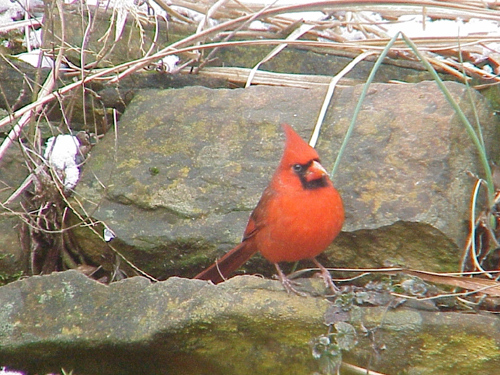
Northern Cardinal (Cardinalis cardinalis) in Kentucky winter.
(*Photo bySally Ramsdell)
February 20, 2022 Willing to Extend Our Compassion
Be compassionate as your Father is compassionate. Do not judge and you will not be judged yourselves; do not condemn, and you will not be condemned yourselves; grant pardon, and you will be pardoned. Give, and there will be gifts for you: a full measure, pressed down, shaken together, and running over, will be poured into your lap; because the amount you measure out is the amount you will be given back. (Luke 6:36-38)
In stormy winter is a perfect time to extend our "family" to neighbors who are in need. Far too often many of us limit family to those within our household, a few relatives connected by cell phones, or an outreach to uncles, aunts and cousins who get together at weddings and funerals. Family, for many of us, means related by blood. Others are committed by some sort of allegiance and call "family" a broader designation that includes those in need of special concern and love. Jesus, when it was announced that his "family" was outside wanting to see him, swept the audience with his arm and exclaimed that all who do his will are in his family -- and certainly included his mother. Let's follow his embrace.
With time and age our sense of family must grow, not diminish, even while we are less energetic and able to travel. Furthermore, our outlook to all who are "related" may take on a global dimension as we begin to acknowledge that a billion people are hungry -- all individuals with empty stomachs, 50 million refugees, those with mental disabilities, the ones who are in harm's way, and those who are struggling with illnesses of many varieties. The 2015 Paris Climate Change Accord is a teaching moment for all to come and work together to save our threatened planet.
Extending the sense of family can be combined with a renewed sense of the power of prayer. The compassion of Christ, shown to us on Calvary through his suffering and death, is now extended in space and time through each Divine Liturgy, which is the work of all the people. When some do not come to be with us, we can miss their presence. This is more acute if ours is a compassionate community and the physical presence of others gives us comfort.
As part of the family we enter into the sufferings of others and pray for them with compassion. Jon Sobrino, a Jesuit survivor of the El Salvador university massacre in 1989, challenges us that in all we do we either crucify Jesus in the 80% of the global marginalized population, or we "take Jesus down from the cross" by accompanying the marginalized in their struggles for a decent existence. In ten days we will enter the Lenten season; let's make this family time, when we truly ask how widely we broaden our family. We need to learn from people who extend their concern and service to distant people who are in need.
Chair of Peter Prayer: Lord Jesus, you set up a structure for extending the Body of Christ through a human/divine effort. You said to Peter that upon this rock you will build a Church, and so it has happened for two millennia. Some popes were not the best of successors who followed head-strong but empowering Peter; a large number were saints; all had their own temperaments. Look kindly on the successor, Pope Francis, and those who follow; look mercifully on those of us who put faith in his leadership in a troubled world. May Francis grow in your grace and mercy.
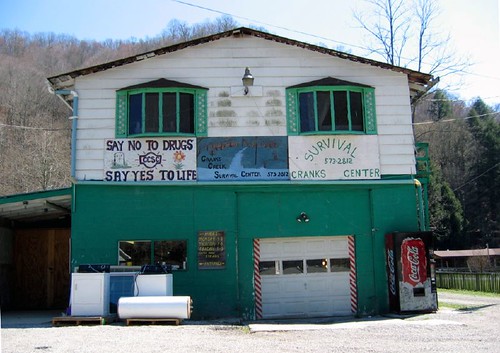
The Cranks Creek Survival Center.
(*photo credit)
February 21, 2022 Rising up of the Poor -- Christian Revolution
The rise of the lowly, the messianic hope of Mary's Magnificat, is a key component of an Earthhealer's goal for saving our threatened Earth. But how can this be done with lack of material resources? I learned much by observing Cranks Creek Survival Center in Harlan County, Kentucky. repair hundreds of homes each year through volunteers; the program was run using disability payments to Bobbie Simpson (blind through a mining accident), his wife the late Becky, and their family members.
This extended clan gives me the theological insight that the poor can do things that can have a ripple effect on a global level. In some ways, Bangladesh is similar to this clan -- a country that is arising. We are convinced that this website can influence a world through a moderately priced Internet program. Is this a hope, a declaration, a challenge, or a combination of all?
Hope underlies all that we do, for without hope we are paralyzed. At first glance, this expectation of change seems insurmountable, but what if we trust in God? Hope moves us forward and does not allow a materialistic status quo to take over and halt our spiritually-oriented activities. For too long, poor folks can harbor the vain wish that they could win a jackpot and become rich so as to help others. The rare few who win sweepstakes generally succumb to greed or are captivated by con artists who take their new-found wealth. A spiritually-based hope has a social content, a power resting in a collective "poor" who help each other with Jesus in their midst. Converting one person at a time is good and not to be denied, but we are talking about a hopeful people with the power of God working within them as a social group.
Declaration is seeing Magnificat as a definitive prayer/song that tells what is happening now and in days to come. However, this means overturning the status quo -- and that is Revolution. We must be convinced that in a non-violent and loving manner we are to change the world around and heal our wounded Earth. The Declaration states what is happening, but not the velocity of the process. We are agents of change and catalysts called by the Lord to hasten the day of the Lord's coming. We are called to excite the poor to revolt in a non-violent manner as part of this process.
Challenges stand before us since the powers adhering to the status quo resist change. Here institutionalized religious structures must examine their role critically, for keeping their structures in place may demand surrender to the status quo bent on no profound change. Wealth and privilege stand as barriers to change. Instead, the Church must help overcome resistance and hasten a redistribution of resources in a fair and equitable manner. We as believers must help overcome wealth barriers that generate economic classes; we must champion non-violent revolution.
Prayer on President's Day: Lord, look kindly on your national leader and give to him the grace to be just and generous in his role. May all of us pray for him and extend support when he does positive things; may we object if imperfection creeps in and yet do our criticism in a positive manner. The president's task is not easy and the people must encourage a successful administration. May we defend our democracy and elected leaders.

Standing guard over the Green River, KY.
(*photo credit)
February 22, 2022 Expanding George Washington's Dream
Interestingly, the position of our first President whose birthday is today, is misidentified with current day political positions. Federalists as an emerging party of which Washington belonged could be regarded as "conservative" from the standpoint of wealthy standings -- the private domain exploiting the Commons for the good of a privileged few. Recall that Washington was a wealthy man, perhaps the wealthiest in Virginia. However, political positions are fluid over time and so comparisons are somewhat misleading. A federal stance in contrast to a decentralized "states’ rights" one was a post-Revolutionary War liberal goal -- a federalized central system resulting from joining disparate colonies into a fledgling national union.
The founding fathers' American vision of unity is similar to the current striving of the European Union (EU) to overcome financial difficulties and join into a more perfect union. As Americans, we must support the EU struggles, for their ancient nationalistic tendencies to go it alone have a far heavier baggage than that of the youthful American colonies. Shared EU fiscal responsibility is difficult to attain.
Also, a functioning African Union made up of youthful nations that lack democratic practice and working infrastructure has a difficult time. In that continent, new nations formed after the Second World War were not created from coherent tribal territories and ethnic clusters; rather, they resulted from accidentally designed colonial territories from the 1880s carving up of a continent. Some, like Madagascar, are self-contained as islands or ancient kingdoms, but most include multiple and divisive tribes.
World federalism looms as a dream due to emerging financial problems related to globalization. The ease of moving unaccounted money from one land to another in an instant transaction leads to shifting of financial resources to less-regulated and lower-taxed mini-states or even certain American states. This ease of movement causes the bidding war for investment, which tends to omit social and environmental constraints. The tendency is to make needed regulations less onerous; social protection within resource nations is weakened in the competition for investments. A downward spiral results and can only be addressed by nations acting together.
An added ingredient to barriers to federalism is the jealousy of privileged nations like America to even consider surrendering any sovereignty to an emerging "higher power." Here Washington's dream gets tarnished. Surrendering national controls to a more perfect union benefits all parties and improves mutual security. Fidelity to George Washington and our founding fathers' dream involves pursuit of global federalism as sound fiscal policy with strict regulations that protects environment and workers.
Confederation Prayer: Lord, allow us to remember the principal founding father of our land on his birthday. George Washington was not perfect, but like all of us he strived to do your will in times of struggle. He cherished an insight that our land would be a union of independent states working together for the Common Good. May his dream expand today; may we be willing to move to embracing a confederated world in need of each other. Help us surrender our selfish isolation for social togetherness.
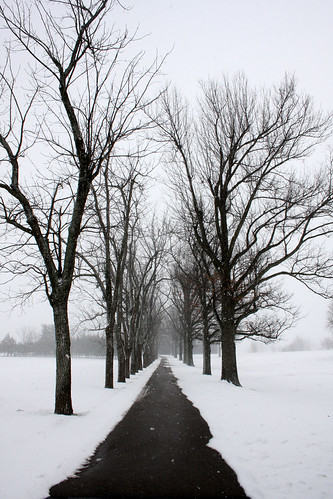
A pathway in the snow. Madison Co., KY.
(*photo credit)
February 23, 2022 Honoring Polycarp, Martyr and Saint
The blood of martyrs is the seed of the Church. Tertullian
Reflecting on our historic Church leaders is part of honoring the great saints of the past. One of these is Saint Polycarp. He was born about thirty years after Christ's death and resurrection. He knew St. John the Evangelist, who was the last surviving disciple of the Apostles. About the turn of the first century Polycarp was elected bishop of Smyrna in Asia Minor and became a leading Church figure until his death by martyrdom. He was a vocal defender of the Church by speaking out against Marcionism and Gnosticism. For several centuries afterwards, his letter to the Philippians was read in Asia Minor. He attacked the numerous heresies among Christian communities even amid the eternal danger of outright persecution by the Roman imperial authorities. His writings and actions were immensely influential among other early church leaders such as Irenaeus, bishop of Lyons.
Toward the end of his life at age 80, Polycarp journeyed to Rome to discuss determining the date of Easter; he argued to celebrate this feast on the 14th day of the Jewish month of Nisan on whatever day of the week this might fall. He said this was the custom of the Asian Church with its direct apostolic influence. He did not convince Pope Anicetus who wanted Easter to be celebrated on a Sunday (though every first day of the week was Easter as far as Rome was concerned). Yet these differences did not break their bonds of unity; Polycarp celebrated the Easter liturgy in the Pope's own church. Differences in practice did not separate the Church, for Polycarp was an early proponent of ecumenism.
Polycarp's martyrdom was triggered by the death of a youth at a pagan festival that was blamed on the "atheists" of which Christians were termed, for not worshipping Roman gods. Polycarp refused to deny Christ, and for his steadfast refusal was killed by the sword and his body burnt. However, his Christian disciples quickly gathered his bones as relics "more splendid than gold." They were some of the first public accounts as witnesses to the cult of saints and of relics. Furthermore, at this very early period (at Polycarp's death) the custom was initiated of celebrating a person's feast occurring on the day of his or her death, the day of birth into eternal life.
Martyrdom was to become far more commonplace in the 140 years after Polycarp's death during the major Roman persecutions. Polycarp was in many ways a forerunner of what would happen to Christian leaders who spoke openly down through the centuries. Even to this day and after witnesses in every century (the 20th century being the largest number of martyrs), the testimony of dying for Christ (as Christ died for us) continues to this day.
Saint Polycarp: You knew the Apostle John and you were a friend of Ignatius of Antioch. You were a connecting human link between apostolic times and the early church in Asia Minor. You tried mightily to imitate John's love for Christ and all who belong to his Body. In your service as bishop, you aroused the disfavor of a pagan surroundings and suffered martyrdom at the burning at the stake. Your life was one of fire for the Lord and championed a feast for Easter for all to celebrate. May we imitate your activism and devotion.
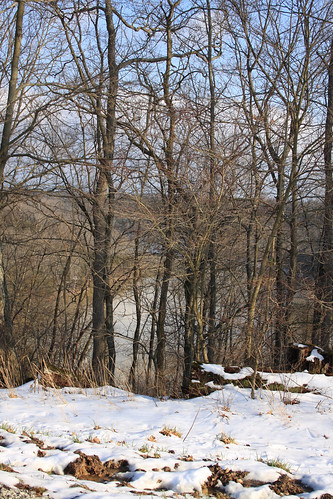
An overlook near the forest's edge. Taylorsville Lake, KY.
(*photo credit)
February 24, 2022 Fracking: Panacea or Problem?
Hydraulic fracturing of shale rock formations to release nature gas supplies is now the commonly-used Fracking process. As a source for plentiful natural gas, the process is now taken for granted by the fossil fuel industry. A mixture of water, sand, and chemicals to make the water "slippery" is forced down a drilled hole deep underground in a shale formation; cracks are opened allowing gas to escape. The process is highly profitable; the formations are enormous in scope and found in many countries; and the potential exists to utilize trillions of cubic meters of gas, doubling the known gas reserves in a matter of time since the turn of this century. Our heating gas bills have been reduced over the past two decades thanks to fracked gas.
Panacea, well not quite, though it sounds great! France and other European nations refuse to utilize the method, while many in the U.S. regard fracking as a road to energy independence. However, that claim may be exaggerated, for fracking has several emerging problems. First, the chemicals used in the fracking process could escape and get into aquifers, though many drilling operators discount this as a major concern due to the depth of the drilling. Ingredients are trade secrets that are revealed to doctors who must treat those affected by fluids, provided they hold this secret.
Second, escaped gas will undoubtedly occur in the drilling operation even with drillers seeking to conserve for the bottom line. By weight, the climate change potential of the escaped gas is two dozen times more potent than the carbon dioxide emitted from burning coal with all its pollutants. Thus, the "cleaner" natural gas combustion method is being challenged. Some have estimated two percent escaping natural gas (others even more), but that makes it as dirty as coal or oil from a climate change perspective. Others have darkly estimated that it is perhaps on an average (operations vary) up to four percent -- setting off environmental alarm bells. Pessimists say that fracking increases the rate of global warming; optimists call for greater regulation that will solve venting problems. Amounts of escape may depend on the driller.
However, "Welcome to the Golden Age of Fracking" in Acid News (June, 2012) highlights another problem area: the less costly and plentiful supply of natural gas extends the time of fossil fuel dependence and reduces a demand to implement energy efficiencies. Why insulate if gas is cheap? Fracking is not equivalent to the panacea offered by the nuclear power industry after the Second World War as an energy source "too cheap to meter." However, major environmental groups have backed natural gas as the bridge to wean us away from fossil fuels, but doesn't this trade one dirty fossil fuel for another? And climate changes continue at an ever-accelerating rate. Caution! Let's move to being carbon free.
Grace for Humility: Lord God, you are grand and we are your creatures; all we have is from you. We refrain from saying that we are "nothing," for in the eternal image of you we were created; that is itself a grand gift. Rather than nothing, we see what we really are, and we, like Mary but to a lesser degree, realize that we are truly blessed. In this knowledge we show gratitude for your love and mercy reflected in the community of Faith in which you have placed us. We have often ignored your great gifts and done evil, and yet now ask sincere forgiveness. In the spirit of your forgiveness, we resolve to do better.
Why Celebrate Ethnicity?
An ethnic consciousness can be highly refreshing, for it invites a sense of togetherness both among recent immigrant arrivals and those who wish to continue a sense of solidarity among the various ethnic and racial groups. A world of many distractions and peer pressure to conform to a larger group may work to weaken that consciousness, as can intermarriage among cultures.
Within the Ethnic Atlas of the United States we have included 250 ethnic major or representative ethnic groups, museums and special festivities, along with pertinent addresses. These are found in the state-by-state discussions and help highlight major and moderate-sized ethnic and racial groups. The listing is by no means exhaustive, and some will fault us for not including a favorite ethnic group – and this was certainly not intentional. Some readers may seek a place to start broadening their ethnic consciousness and becoming acquainted with particular local listed groups as a good beginning.
In reviewing the national maps, certain rural enclaves appear in earlier ones and seem to fade in succeeding censuses. Some may have an interest in one of these fading rural groups and this may trigger a personal probe into the Internet for localities to seek historic or cultural information about them. Most such groups are not lost, but have a recorded history and stories by journalists and researchers. Some ethnic groups also have national societies which will prove most helpful in retrieving overlooked ethnic information. Once a person knows more about the group, especially more local ones, there is an incentive to visit the sites and cemeteries and become acquainted with surviving residents.
Among practices to encourage our own or fellow ethnic consciousness, consider the following suggestions:
*Learn about family and community history, including methods of arrival, first settlement, connections with neighbors, and reasons for leaving a former habitation.
* Attend annual celebrations or promote family and community reunions to stay in touch with those of one’s ethnicity. Encourage others to do the same.
* Plan to return to the motherland for a vacation or social trip to reacquaint with former neighbors of our forbearers. Learn the customs and some of the root language and take pride in reestablishing connections.
* Attend an ethnic celebration of an unassociated group and spread the word that this is enjoyable through social media.
We are convinced that a growth in ethnic consciousness can be part of a deepening sense of environmentalism. When we are moved to broaden our appreciation of our own or others ethnic group, we want them to thrive and grow in a healthy manner. Thus our hopes can extend to the enriching diversity of plants and animals that are now threatened through callous exploitation. Being simultaneously a member of a wildlife group and an ethnic group is a way of improving our awareness of the benefits of both groups and the relationships of their goals. In so celebrating, we come to a deeper understanding of recent migrant groups and their own struggles to survive and flourish. And this all adds to our own broadening of tolerance towards others. That is what can make our nation truly great.

A dandelion, reminder of spring.
(*Photo by Elise Paul)
February 25, 2022 Listing Dandelions' Environmental Benefits
Few people today join us in extending glory to the lowly dandelion, but it is perhaps because many render this noble plant the "junk status" of a weed. Dandelions can be a cornerstone of a simple economy if we see its qualities:
1. No resources human or otherwise are needed to thrive -- Some may regard this as self-evident and it is, but the fact dandelions are so pesky also means that we do not need to spend time cultivating soil, fertilizing or adding pesticides to allow them to grow, or water the plant in dry times. Just allow the dandelion to thrive and it will do the rest.
2. Parts of the plant are nutritious:
* the leaf becomes a nutritious salad with all the freshness of early spring, and works best as a wilted salad with hot oil (bacon grease or vegetable oils) and vinegar, as well as diced boiled potatoes and eggs, and chopped onions;
* the cooked leaf even in summer and autumn involves steeping and pouring off the first batch and using it as a potherb or within meat dishes, stews, and a variety of soups;
* the root can be dried, crushed, and brewed into a hot beverage at very low cost and as a tasty non-caffeinated drink; and
* the bloom can be gathered, fermented and transformed into a golden wine drink that some find refreshing.
3. This is a low-cost replacement for a lawn when one declares it a cover. The persistent greenery of dandelions will challenge neighbors because it requires no water to keep its color; it will demand no fertilizer for virtually any type of soil; it will make no demands on mowing since it will stay approximately the same height. Undoubtedly, objections will come from neighbors who regard it as a weed, and breeze-blown fluffy parachutes of seed as unwelcome invasion of their sovereign space. Okay, city council!
4. This alien from the Old World is naturalized like most other immigrants. Ecologically, many parts of the world ought to welcome this leafy green salad as an added nutritious addition requiring little care or cultivation and thus a welcome friend.
5. This can be a beautiful and uplifting ground cover. Yes, this is really so. Certainly beauty is in the eye of the beholder. I recall a rich carpet of spring greenery in Wisconsin composed entirely of very proliferate and highly endowed dandelions in my springtime stay in that noble state. Often our Kentucky pasturelands come alive in springtime in a mantel of yellow, and this raises my spirits immensely. Yes, I have detected dandelion blooms every month of the year, but the spring color rush and the delicate scent of the bloom always elevates my spirit.
Wild Garlic Prayer: O Creator of all, the first trace of new greenery is the sprouting garlic that you give us, announcing a new growing season even before all the snows and ice are gone. This plant is found in most of the land mass of this Earth, and the sprigs are full of nutrition and flavor. In some way, this is humanity’s one symbol of togetherness in the pleasure this plant offers. Many call it a weed and ignore its benefits. Help us see your creative goodness and find communality in what we strive to be and do together for peace and security.

Two white oaks, gracing the skyline, Anderson Co., KY.
(*photo credit)
February 26, 2022 Protecting Our Face in Winter
We seek to protect ourselves against the harsh winds of winter and so ski masks and other protective gear are common at this time of year. How often do we males think of neglecting to shave -- though that may be a discomfort? Is our facial cultivation to curry favor from those we try to influence? We seek acceptance and so shave in wintertime when every part of ourselves says -- hide your face from the wind. Besides, in some cultures males, and especially the elderly, are allowed the full beard as a sign of dignity and authority. Maybe it is time to examine this in light of shaving commercials and expectations.
The following continues our practice of promoting the current book, Appalachian Sensations: A Journey through the seasons.
February -- Wearing Whiskers
Fine as oil on the head
running down the beard,
running down Aaron's beard
to the collar of his robes.
(Psalm 133:2)
The gray facial hair of a senior citizen is a magnificent sight, a sign of the autumn of life, an announcement of the cumulated wisdom and courage of one who has lived so long. The young offspring take delight in touching those whiskers and beards. It is an elementary sign of respect for elders, seeing values worth imitating, and inquiring of their own experiences before their minds become too confused to tell stories. Elders are the most precious resource of a community, but we neglect to learn their stories in verse or prose by heart as in times past. Audio- and videotapes can capture their exploits before it is too late. Record their memories so that future generations can stay in touch with them.
In the Scriptures, oil is the symbol of life, and the abundant oil of the elders must be tapped for a people in great need of models and a sense of history. The experiences of elders can become the precious oil lubricating the creative machinery of future generations. We must pass on Appalachian traditions, and records of the elders are key to this. Let these photos be part of that undertaking.
Prayer for Acceptance of Reality: Almighty God, open our eyes to see that things can go wrong, and that what we thought would be highly successful may have negative consequences. May we take success and failure in stride, and realize that life's journey has bumpy portions and detours. Make us serene in attitudes, clear in insights, and grateful in accepting your forgiveness and mercy.
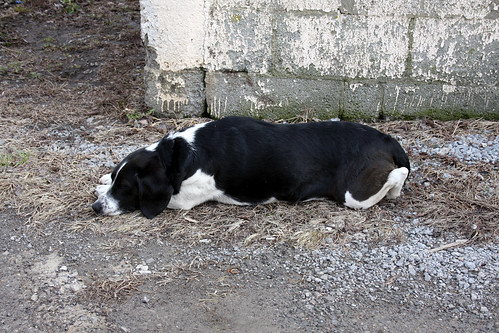
A lazy hound at old country store. Mercer Co., KY.
(*photo credit)
February 27, 2022 Failing to Speak Out
Can a blind man act as a guide to a blind man? Will
they not both fall into the ditch? (Luke 6:39-45)
In this eighth Sunday in Ordinary Time we reflect on the injustice that abounds in our world, especially among those who passively submit to unjust economic conditions. If injustice is against me as a person, the Spirit may direct me to silent acceptance; if against another, we must protest in every way we can. Even Mary, the other women, and John protested by standing beneath the cross; other apostles in all their bravado and posturing ran and hid; the women were the protestors and those apostles became the fearful ones.
Permit me retell a story of once attending a global consciousness-raising game play: ninety percent of the audience were given a simple rice meal and ten percent a steak-and-gravy feast. We ninety percenters were to reflect as though we were the poor. So what did I do? Why, the only Christian thing: I organized part of the majority and went over and seized the steak dishes and divided them equally; thus, none would have too much and "pig out," and none were to go home somewhat hungry. Some other players (the privileged ones) complained that we spoiled the event. I protested that we made it a success. Why should we tolerate such differences and remain politely silent while others were hurt by overindulging?
Protesting injustice is needed if we are to rid this world of the many obvious injustices: lack of food and essential human needs; overly wasteful affluence; the privileged going undertaxed; and a rampant militarism. Yes, all too often we persist in acting out the part of passive observers of events as though they are inevitable. We are silent with a deafening silence, for if we say something we might be declared out of order. Looking at Sirach's words in today's first reading we ask whether we consume world resources and conceal this from the poor? If we allow such conditions without protest, we are a silence party to injustice.
A misdirected scriptural passage relates to Jesus' saying the poor will always be with us. Taken out of context this is made to justify ongoing poverty. However, our failure to address this persistent poverty means that we will be challenged over and over -- and this means the problem will stay with us a long time. The possibility that all injustice will not be eliminated does not stop us from taking the positive steps needed at a given time. Even with all the work ahead, we must protest injustice with all our limited strength. In and through protest, we affirm the need for improvement in time -- and are willing to work for it, not to be complacent about the status quo. We must work for change.
Prayer for Good Temptations: Holy Spirit, you move us to do the right things so many times that we overlook the calling that is a temptation to grow in perfection. May we recall these moments when we summarize our day before falling asleep. Thank you for the good motions, which hopefully we accept each time. Where evil abounds in our world, the good will all the more abound. Keep us balanced in our journey of faith and inspire us to encourage others to do good deeds as well.
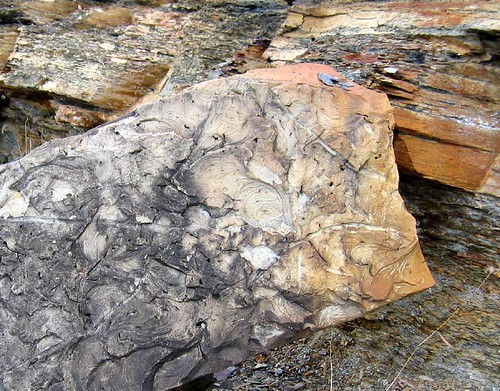
Zoophycus fossils in rocks surrounding Cave Run Lake, KY.
(*photo credit)
February 28, 2022 Inducing Sleep without Pills
We need sleep, but amounts may vary; we must keep minds sharp and agile. There is no guarantee of lifelong sharpness, and so as we age our minds become forgetful and can become dull like a used knife. Part of habitual practice used to retain physical dexterity must be extended to the mind as well. Many elders may have difficulty in falling asleep, though a particular exercise may not work for everyone. Refraining from pills, if possible, could include one or other of these non-drug approaches:
Reading ourselves to sleep -- This is a favorite manner of inducing sleep that is perhaps the most used for people willing to read in bed. I have found it difficult to continue that habit, but do regard it as intellectually stimulating, if you do not want to sleep too fast, and if the reading material is not too dense.
Praying ourselves to sleep -- A salutary habit may include a thoughtful recounting of the day (an "examen") and the things achieved with a word of thanksgiving to God for allowing us the opportunity to do good for and with others. One favorite type of night prayer is praying the rosary; this is a repetitious use of known prayers said in sequence with various mysteries in the life of Christ and Mary as foundations for reflection and meditation. Through the centuries many have found this and other prayers that still do not demand a concentrated meditative state as prayerful favorites. Another possibility is to pray for various people and subjects and to allow them to parade past the memory.
Counting ourselves to sleep -- Counting sheep is way too monotonous for most of us, and I often doubt whether anyone has done this for long. However, one can count place names (cities, counties, mountains, rivers, capes, cities, military installations, and historic sites for each state attempting to get an average of one per one hundred thousand people per state (you have to know these populations in advance). This means that Delaware has 10 (easy) and California about 390 (difficult for a non-resident). Kentucky, West Virginia, and Virginia are easy for Appalachians due to proximity and familiarity, and Alaska with much land and low population is easy for all with a smidgen of geographic knowledge. A variation on this last theme is to count only cities and towns if you know 3,000 or more, or to count U.S. counties (there are a little more than 3,000 of these). Actually, this could be a way of keeping our minds agile, though much attention may retard sleep.
I have actually used the counting method quite often except when very tired. If we accept the fact that we do not need sleep then the lack of stress puts us in slumberland faster.
Grace for Solitude: As we move to a new month, Lord, we have the stirring within to become more active. However, we should treasure the gift of solitude or the silence of heart. This gift ensures our peace of soul and is worthy of continuous gratitude, for without it we are troubled and restless to the point of imbalance. We need these quiet moments and the desire to affirm we are not alone when we have you, Lord, as our companion. We pray for those who lack companionship and feel their loneliness as a distraction. May these be filled with your presence.
|